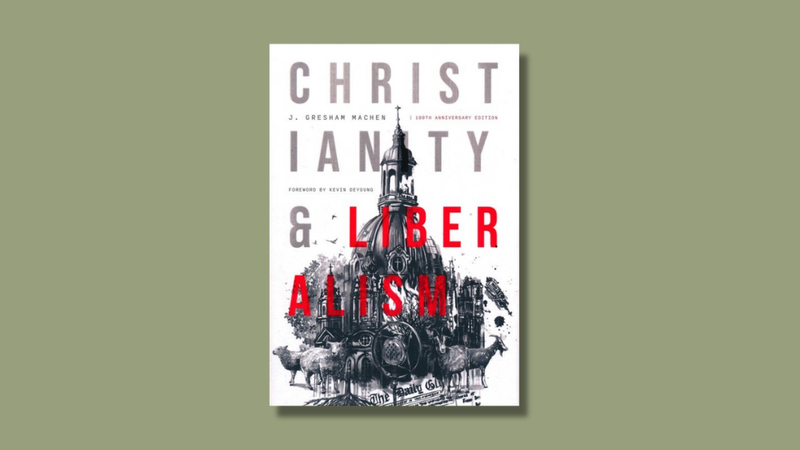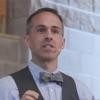When I attended Calvin College back in the early 2000s, students who believed in biblical inerrancy were roundly critiqued and mocked. It felt like an entire generation of future pastors were being wiped out in the Religion Department. By God’s grace, a rogue professor in a different department took a number of us future pastors under his wing. He led us through Christianity and Liberalism by J. Gresham Machen, and the Lord used that book to hold us fast by his grace.
In 1923, Machen wrote Christianity and Liberalism and the book made an immediate impression across much of American Christianity. Even secular critics found the book to be formidable and Machen’s theological integrity to be admirable. This book not only impacted Machen’s contemporaries but every generation since. It made this list…and that.
Why was Christianity and Liberalism so important in 1923?
In the early twentieth century, American Christianity—especially in the mainline Protestant denominations—was seemingly on the ropes. Theological liberalism—which denied core Christian doctrines—was being imported from the German academy and fused with an American pragmatism that tended to value truth claims based on their effects rather than whether they were actually true.
This virulent theology overtook one seminary or denominational organ after another, corrupting the shepherds and leaving Christ’s flock vulnerable to their predations. A number of scholars rose up to defend the fundamentals of the Christian faith, but a much more piercing critique of this invasive theology was needed in order to rally the faithful in the Christian church.
In stepped Machen with Christianity and Liberalism. He cut through the faux unity of the liberals and theological “indifferentists,” and presented liberal theology as an entirely different religion that stood in direct opposition to Christianity. It was a modernist theology, in that it bought into the zeitgeist of the age that exalted human reason over and against God.
It was also a naturalistic theology, in that it denied everything supernatural about and within the word of God. It denied the divinity of Jesus Christ, including his virgin birth, his atoning death in the place of sinners, and his resurrection from the dead. In these ways and others, they believed the same things as outright opponents of Christianity—only they believed that Jesus’ moral example was still of value.
Theological liberals would typically argue that Christianity is simply a life, an ever-changing reflection of individual experience. While they sought to totally unmoor Christianity from fact or history, Machen argued the opposite. True Christianity, according to both Machen and the Bible—was rooted in real history. And it was rooted in facts and their meaning—what we call “doctrine”—that provided the basis for the Christian life.
Aside from the fact that theological liberalism was a counterfeit Christianity (a charge already sufficiently weighty), Machen also took issue with the cynical dishonesty of the liberal camp. They didn’t openly acknowledge how their teachings veered from orthodox Christianity, but simply changed the meaning of biblical terminology to suit their own ends. When they spoke of “Christ,” they were truly speaking of a moral man and nothing else. “Salvation” often was made to look more like a human utopia.
This rank dishonesty is what allowed liberals to co-opt the church. Christians in the pews were constantly exposed to heretical concepts in orthodox garb. At Old Princeton Seminary—where Machen both trained and taught—liberalism began to be both tolerated and taught. In the Presbyterian Church (USA)—where Machen served as an ordained minister—they began to send unbelievers to the mission field to spread the liberal gospel.
Christianity and Liberalism fell upon this murky milieu like a thunderclap, clearly defining the line between truth and falsehood. Machen was labeled “the Great Fundamentalist,” which is ironic in that he was not simply trying to preserve a few fundamentals but was defending the whole of Christianity against its opponents. Orthodox churches and evangelical seminary students flocked to his side and the battle for Christianity in America was joined in earnest.
Why is Christianity and Liberalism still important in 2024?
For the same reason that a handful of college students could find renewed hope in Machen’s clarion call in the early 2000s, we can do the same today. If we truly take Christ at his Word, we will follow him, stake our lives upon him, and resist all cultural pressures to make him into something he is not. In other words, Christianity still means something, and Christ still means everything to the Christian.
The Christian church is still beset on all sides, not only by outright opponents but by corrupting influences in the church—as well as those who would turn a blind eye to those influences until it is too late. We are told that Christianity is about love or being a good person. Or that it is one of the great historical religions. We are still told that the Bible was teaching things relative to the culture of the time, and thus part of it should be dismissed in the face of our present culture and experiences.
Linguistic relativism is also more fully entrenched than it was back in Machen’s day. We rarely can agree upon the definition of terms we use, so we simply speak past each other instead. But we still innately know the things that are true, even if we suppress the truth in unrighteousness (Rom. 1). That means that there are still footholds within the broader culture if we are willing to take them and places to advance if we will but measure our steps carefully.
It is fitting that Machen’s final chapter in Christianity and Liberalism focuses on the church, because we have no business talking about how Christianity can permeate the culture if we will not insist upon a Christian church. In the present day, Christians are often tempted to carry water for political parties and cultural movements rather than bring the Water of Life to the lips of the parched. We fight battles over how to engage the culture without bothering to discuss what it is we are trying to defend.
Liberalism, for Machen, was not defined in cultural, but doctrinal terms. The gospel is not something to be assumed—rather, it should be assumed that our hearts will be sanctified and our wisdom enhanced relative to the culture if we first understand the gospel. Jesus lived a perfectly righteous life, died on a Roman cross, and was raised three days later. These are facts. He did all this for the sake of his sinful people. This is the meaning. Together, facts and meaning form the doctrine that becomes the foundation of the Christian life. Let us continue to stand upon this doctrine—and upon Christ himself—that we might not give an inch as we contend for the gospel.






